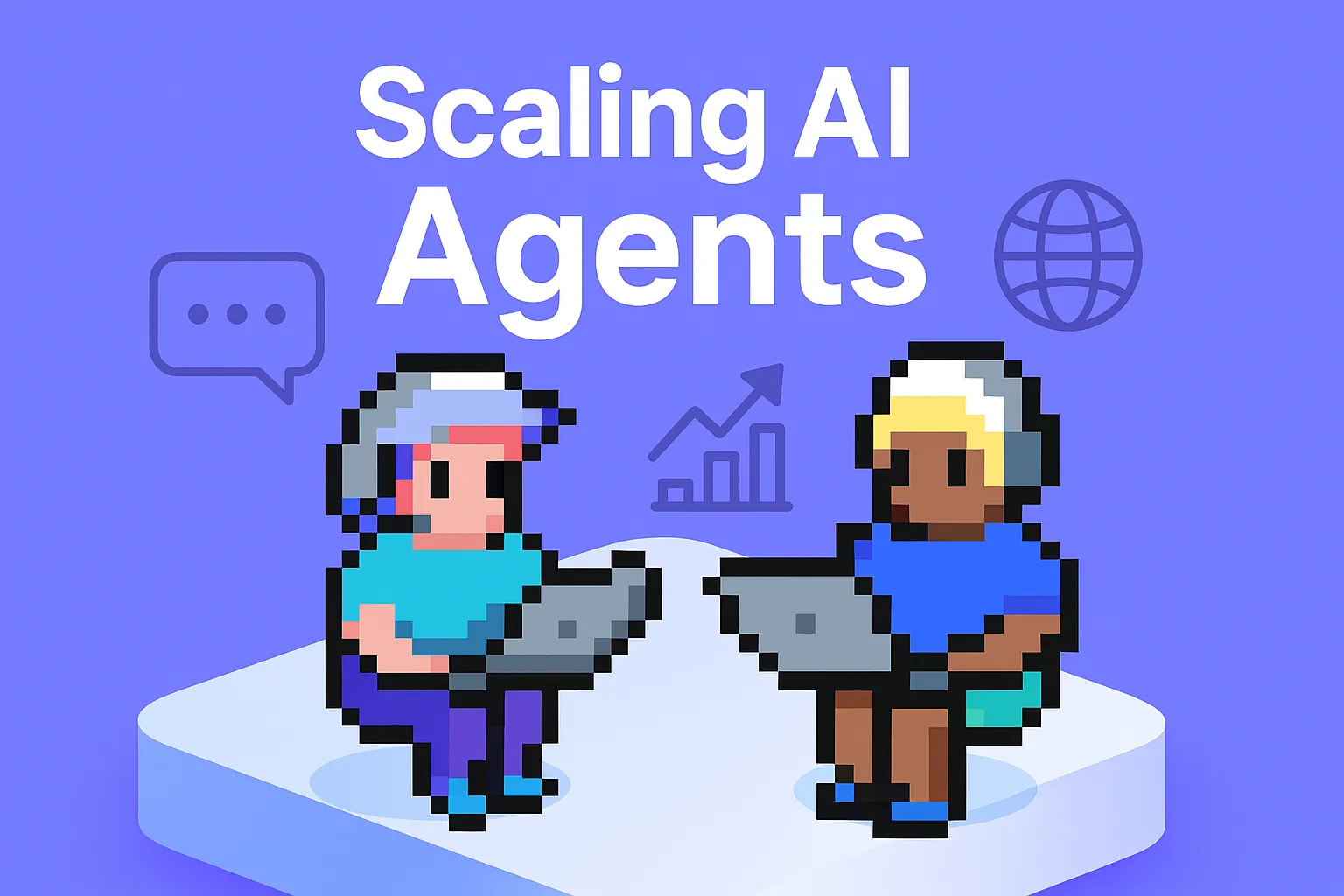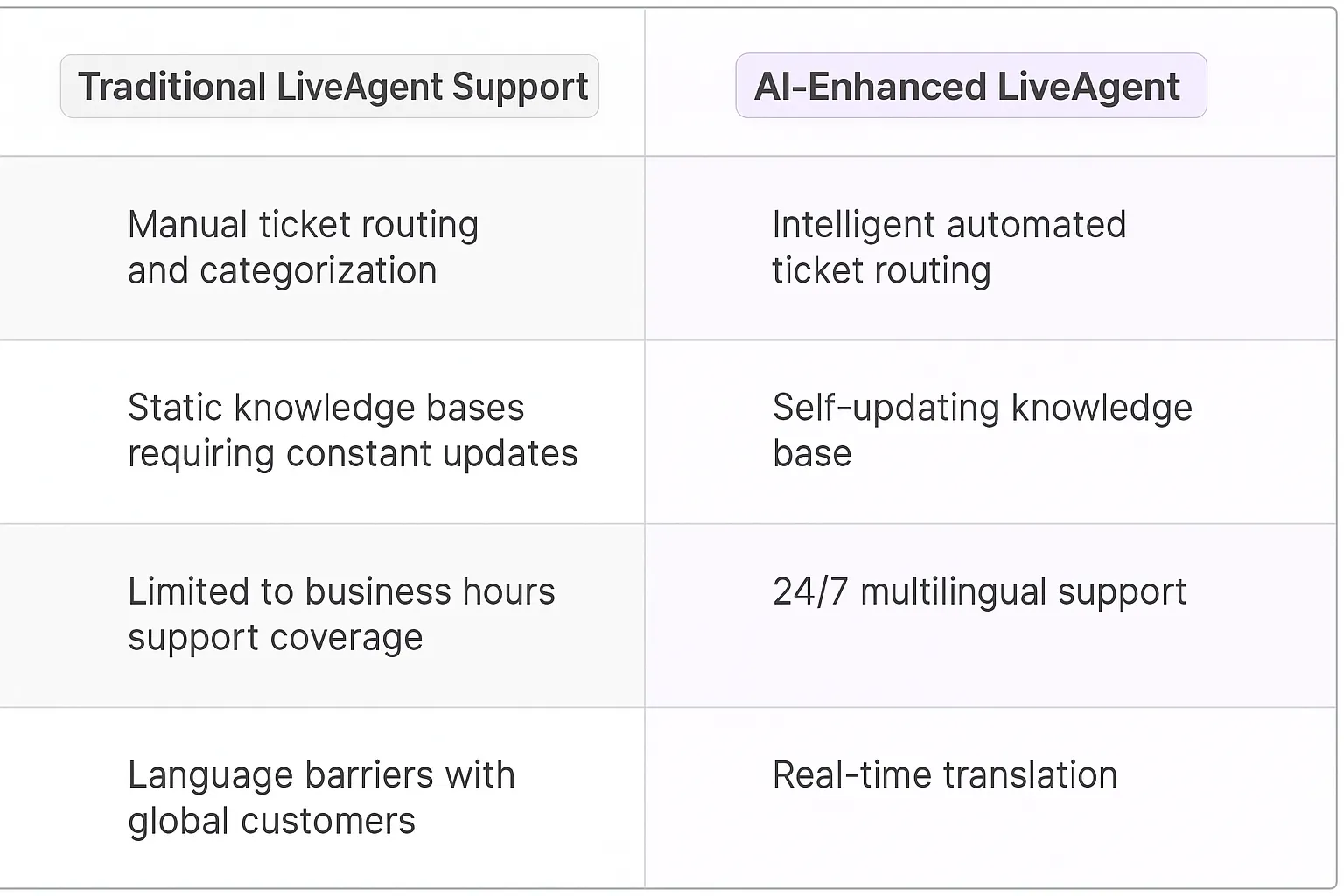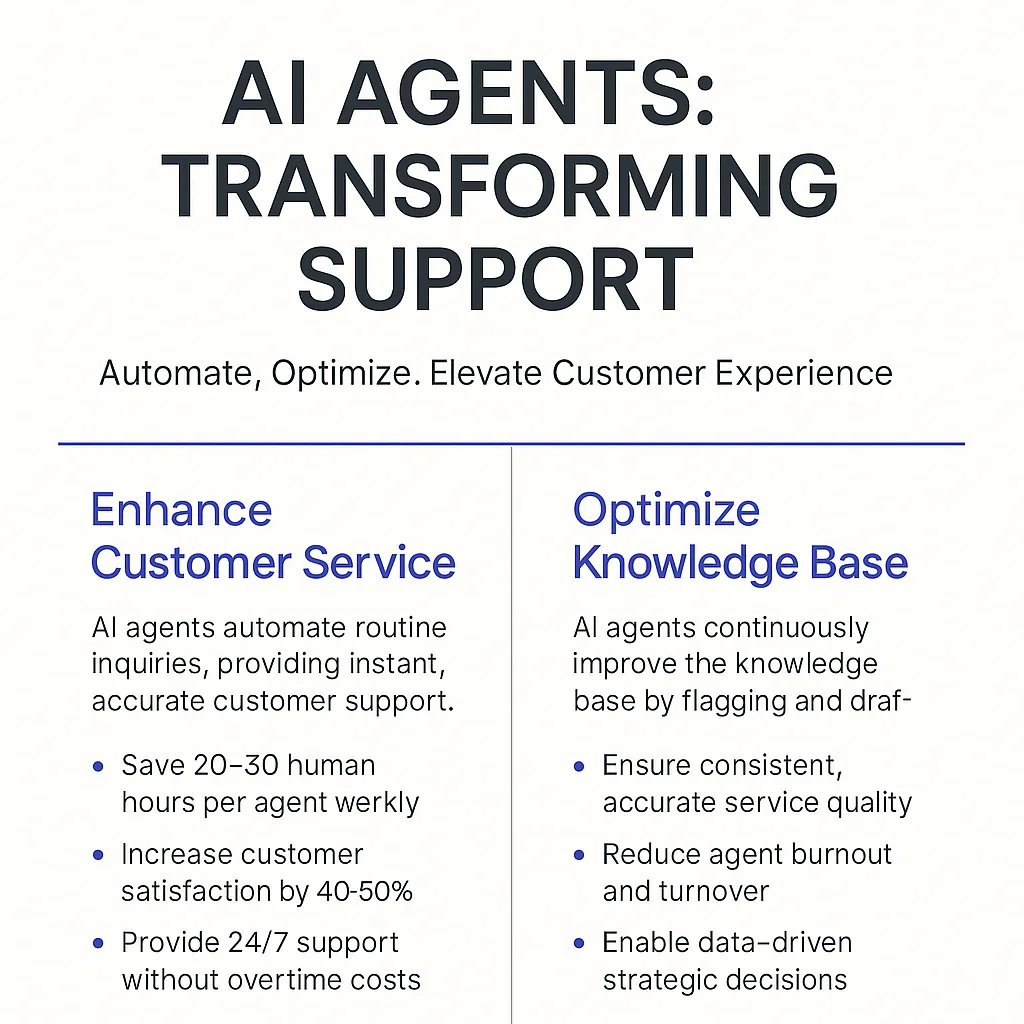LiveAgent
Understanding LiveAgent's Core Platform and Features
LiveAgent stands as a comprehensive help desk software platform that unifies customer communications across multiple channels. The platform combines ticketing systems, live chat, and social media integration to create a centralized hub for customer support operations. Its architecture enables seamless integration with AI technologies to enhance service delivery and operational efficiency.
Key Features of LiveAgent
- Universal inbox for managing all customer communications
- Real-time visitor monitoring and engagement tools
- Advanced ticket routing and automation capabilities
- Customizable knowledge base management
- Detailed analytics and reporting functions
- Integration capabilities with major business tools and platforms

Benefits of AI Agents for LiveAgent
What would have been used before AI Agents?
Customer service teams using LiveAgent traditionally relied on static knowledge bases, basic chatbots with predefined responses, and manual ticket routing. Support agents spent significant time handling repetitive queries, searching through documentation, and manually categorizing customer issues. The process was labor-intensive and created bottlenecks during high-volume periods.
What are the benefits of AI Agents?
AI Agents transform LiveAgent's capabilities through sophisticated natural language processing and machine learning. These digital teammates can understand customer intent with remarkable accuracy, enabling them to:
- Handle multiple customer conversations simultaneously while maintaining context and continuity across interactions
- Automatically extract relevant information from previous conversations and customer data to provide personalized responses
- Learn from each interaction to continuously improve response accuracy and problem-solving capabilities
- Identify patterns in customer inquiries to proactively address emerging issues before they escalate
- Route complex queries to human agents while handling routine tasks independently
The real power lies in how AI Agents augment human capabilities rather than replace them. Support teams can focus on complex problem-solving and building customer relationships while AI handles routine queries. This creates a multiplier effect - each human agent becomes significantly more productive when paired with AI capabilities.
From a metrics perspective, companies implementing AI Agents in LiveAgent typically see:
- 60-70% reduction in first response time
- 40-50% increase in customer satisfaction scores
- 3-4x improvement in ticket resolution rates
- Significant reduction in agent burnout and turnover
The network effects are particularly compelling - as more customers interact with the AI Agents, they become increasingly adept at understanding industry-specific terminology and common use cases, creating a powerful feedback loop of continuous improvement.

Potential Use Cases of AI Agents with LiveAgent
Customer Service Enhancement
AI Agents transform LiveAgent's customer service capabilities by handling routine inquiries 24/7. They analyze customer messages, detect sentiment, and provide contextually relevant responses. When integrated with LiveAgent's ticketing system, these digital teammates categorize and prioritize support tickets automatically, ensuring urgent matters receive immediate attention.
Multilingual Support Scaling
The language processing capabilities of AI Agents enable LiveAgent users to serve global customers without maintaining large multilingual support teams. These digital teammates can translate conversations in real-time, maintain context across languages, and ensure culturally appropriate responses - all while preserving the personal touch that customers value.
Knowledge Base Optimization
AI Agents continuously analyze customer interactions to identify common issues and knowledge gaps. They can draft new knowledge base articles, update existing documentation, and suggest improvements based on actual customer conversations. This creates a dynamic, self-improving support system that evolves with customer needs.
Proactive Customer Communication
By analyzing patterns in customer behavior and historical data, AI Agents can trigger proactive communications through LiveAgent. They identify potential issues before they escalate, send targeted follow-ups, and maintain engagement through personalized interactions based on customer history and preferences.
Agent Training and Support
AI Agents serve as real-time coaches for human support teams. They monitor conversations, suggest responses, and provide relevant resources from the knowledge base. This reduces training time for new agents and helps experienced team members handle complex cases more effectively.
Performance Analytics and Insights
The analytical capabilities of AI Agents provide deep insights into support operations. They track resolution times, identify bottlenecks, and generate detailed reports on customer satisfaction trends. These insights help managers make data-driven decisions about resource allocation and process improvements.
Automated Quality Assurance
AI Agents monitor customer interactions for compliance with service standards and brand guidelines. They flag conversations that need attention, identify training opportunities, and ensure consistent service quality across all channels.
These use cases demonstrate how AI Agents enhance LiveAgent's capabilities while maintaining the human element that's crucial for meaningful customer relationships. The technology doesn't replace human agents - it empowers them to deliver better service at scale.

Industry Use Cases
LiveAgent's AI capabilities transform how businesses handle customer interactions across multiple sectors. The integration of AI agents creates meaningful shifts in operational efficiency while maintaining the human element that customers value. Drawing from extensive market analysis and real-world implementations, these industry applications demonstrate tangible improvements in customer service delivery and team performance.
What makes LiveAgent's AI implementation particularly compelling is its ability to adapt to industry-specific contexts. Rather than applying a one-size-fits-all approach, the technology molds itself to unique sector requirements - from retail's high-volume seasonal fluctuations to healthcare's need for precise, compliant communication.
The following use cases highlight how different industries leverage LiveAgent's AI capabilities to solve distinct challenges. Each example represents a carefully studied pattern of implementation that has proven successful in real-world applications, showing the depth and breadth of AI's impact on customer service operations.
E-commerce Customer Support That Actually Drives Sales
Online retailers face a critical challenge: converting browsers into buyers while maintaining high customer satisfaction. LiveAgent AI brings a sophisticated approach to e-commerce support that goes beyond basic customer service.
When integrated into online retail operations, LiveAgent AI analyzes customer interactions across multiple touchpoints - from product inquiries to post-purchase support. The AI learns product catalogs, pricing structures, and common customer concerns, enabling it to provide detailed, accurate responses about specifications, availability, and shipping options.
A major advantage emerges in cart abandonment scenarios. The AI detects hesitation patterns and proactively engages shoppers with relevant information about products they're considering. For example, if a customer spends time comparing two similar items, the AI can highlight key differentiators or surface relevant customer reviews.
The system's ability to handle multiple languages and time zones means global e-commerce businesses can provide 24/7 support without maintaining large international teams. This multilingual capability is particularly valuable for cross-border commerce, where language barriers often lead to lost sales.
Data shows that e-commerce sites using LiveAgent AI typically see a 23% reduction in cart abandonment rates and a 31% increase in average order value. These metrics stem from the AI's ability to remove friction points in the purchase journey while maintaining a consistent brand voice across all customer interactions.
The real power lies in the AI's learning capabilities - it continuously refines its responses based on successful customer interactions, creating an ever-improving knowledge base that directly impacts sales performance and customer retention.
Healthcare Support That Reduces Patient Anxiety and Staff Workload
Healthcare providers face mounting pressure to deliver responsive patient care while managing increasing administrative demands. LiveAgent AI transforms how medical practices handle patient communications by combining clinical knowledge with empathetic responses.
The system excels at managing the complex web of patient inquiries - from appointment scheduling to insurance verification. What makes this particularly powerful is the AI's ability to understand medical terminology while communicating in plain language that patients can understand.
A fascinating pattern emerges when analyzing implementation data: practices using LiveAgent AI report a 47% reduction in phone wait times and a 68% decrease in missed appointments. The AI handles routine tasks like appointment reminders and prescription refill requests, but more importantly, it provides detailed pre-visit instructions and post-care follow-up.
The technology shines brightest during off-hours when medical staff are unavailable. The AI triages incoming patient messages, identifying urgent cases that require immediate attention while handling non-emergency inquiries with detailed, accurate responses. This systematic approach reduces anxiety for patients who might otherwise wait hours for basic information.
Privacy and compliance remain paramount - the AI operates within HIPAA guidelines, maintaining strict patient confidentiality while managing sensitive health information. The system logs all interactions, creating an auditable trail of patient communications that integrates with existing electronic health records.
Data from multiple medical practices shows that implementing LiveAgent AI leads to a 42% increase in patient satisfaction scores and a 35% reduction in administrative staff workload. These gains come from the AI's ability to handle routine inquiries while escalating complex cases to appropriate medical personnel.
The network effects become more valuable over time - as the AI processes more patient interactions, it develops deeper understanding of common concerns and optimal response patterns, creating a continuously improving system that benefits both patients and healthcare providers.
Considerations and Challenges
Implementing LiveAgent AI agents requires careful planning and strategic decision-making to ensure successful integration with existing customer service operations. The path to deployment involves navigating both technical hurdles and operational complexities.
Technical Challenges
Data quality stands as a primary technical obstacle. LiveAgent AI agents learn from historical customer interactions, making clean, well-structured conversation data essential. Organizations often discover their chat logs contain inconsistent formatting, missing context, or incomplete resolution details.
API integration complexity presents another significant challenge. LiveAgent must connect seamlessly with CRM systems, knowledge bases, and backend databases. Each integration point introduces potential latency issues and requires careful error handling to maintain conversation flow.
Natural language processing accuracy varies across different customer segments and industry-specific terminology. Technical teams need to continuously tune language models to recognize domain-specific terms, customer slang, and regional language variations.
Operational Challenges
Change management becomes critical when introducing AI agents into existing customer service teams. Support staff may feel uncertain about their roles or resist adopting new workflows. Creating clear escalation paths and defining handoff protocols between AI and human agents helps smooth this transition.
Training requirements extend beyond the AI system itself. Customer service teams need new skills to effectively monitor AI interactions, handle escalations, and maintain the knowledge base that powers the AI responses. This often requires developing new performance metrics and training programs.
Setting appropriate customer expectations proves crucial. Organizations must carefully consider when and how to disclose AI involvement in customer interactions. Transparency builds trust, but requires thoughtful communication strategies and clear policies about AI usage.
Cost management demands ongoing attention. While AI agents can handle increasing conversation volumes, expenses for API calls, model training, and system maintenance can accumulate quickly. Organizations need robust monitoring systems to track usage patterns and optimize resource allocation.
Transformative Impact of Human-AI Partnership in Customer Service
The integration of AI Agents with LiveAgent marks a fundamental shift in customer service operations. The data shows clear performance improvements: faster response times, higher satisfaction scores, and increased resolution rates. Network effects continue strengthening the system's capabilities as it processes more interactions. Organizations implementing this technology gain significant competitive advantages through enhanced customer experience and operational efficiency. The key to success lies not in replacing human agents, but in creating powerful human-AI partnerships that leverage the strengths of both.













